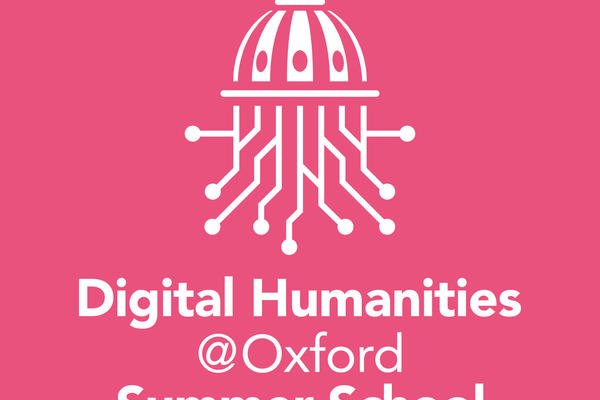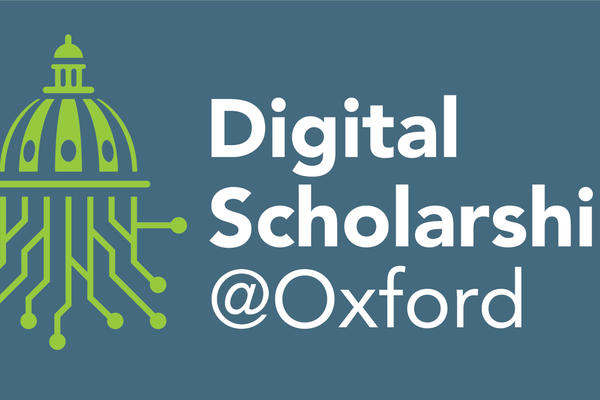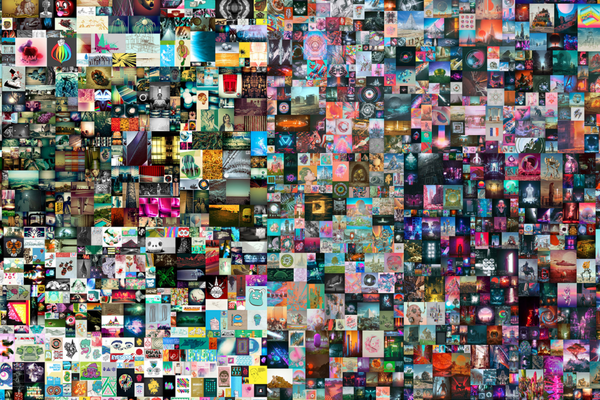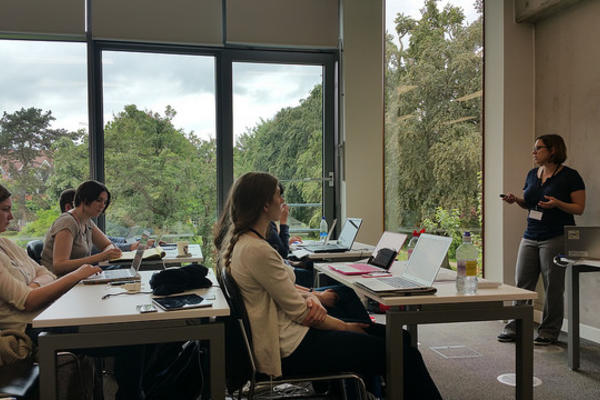Digital Humanities @ Oxford Summer School
Learn from experts in the Digital Humanities in the beautiful setting of St Anne's College, Oxford
The Digital Humanities @ Oxford Summer School (DHOxSS) is a world-leading, not-for-profit training event offering a range of expert-led courses on digital humanities tools, techniques and research methods. With options for all levels, led by experts who are innovating in the digital humanities, DHOxSS is a unique opportunity to enhance your skills and grow your network professionally in a supportive environment.
Please note that we can take block bookings from academic institutions - contact us for more details!
Keeping in touch
To find out about this year's summer school, please sign up to our mailing list or follow us on Bluesky or LinkedIn.
If you have any questions about the upcoming summer school you can contact the events team at dhoxss@humanities.ox.ac.uk
Bursary applications
We have now closed our bursary application form for 2026. If you're considering applying for a bursary to attend next year, you can read through some tips for writing your application (the application form will open in January 2027).
Programme
The 2026 programme is available here.
Take a look at some previous programmes:
- The 2025 summer school
- The 2024 summer school
- The 2023 summer school
- The 2022 summer school
- The 2019 summer school
- The 2018 summer school
Video
In 2025 Gale kindly funded bursaries to DHOxSS. You can watch a video Gale created about the 2025 Summer School here:
Dan Crane, Neil Jefferies, Meriel Patrick, Rowan Wilson (University of Oxford)
This strand introduces a variety of approaches to dealing with humanities data. Data types discussed include textual, tabular and visual. Attendees will hear from presenters experienced in working with these methods, and be given the opportunity to try some of them for themselves via practical exercises. The goal is to equip those undertaking or supporting research with the knowledge to select from a range of solutions that will work for their projects.
Learning Objectives:
- Learn about a range of methods for working with humanities data
- Gain insight into how various technologies and techniques could be used to enhance a research project
- Develop confidence in identifying and selecting the appropriate approach for a given project
Level: Introductory
No knowledge of specific software or techniques is assumed.
An in-person version of this strand took place in 2025 - view the 2025 programme here.
William Nixon (Research Libraries UK) and Ayla Karaman (University of Oxford)
This strand explores how artificial intelligence, and in particular GenAI is transforming the role and impact of research libraries and digital scholarship. Attendees will hear from a range of current practitioners and engage with current AI tools and strategies to support, discovery, curation, and engagement in research libraries and across the GLAM sector.
Learning objectives:
- Understand the strategic role of AI in research libraries and cultural heritage institutions.
- Develop practical competencies in AI tools, prompting techniques, and agent-based workflows.
- Recognise how best to apply ethical and responsible AI principles to support trustworthy and inclusive innovation
Level: Entry-level.
A similar but not identical online strand called AI in Research Libraries took place in 2025 - view the 2025 programme here.
This strand is offered in collaboration with Research Libraries UK.

Professor David De Roure (Oxford eResearch Centre and Digital Scholarship @ Oxford, Oxford) and Dr Jack Orchard (Bodleian Libraries, Oxford)
If you are new to digital humanities, this lecture-based survey strand gives you a thorough overview of the theory and practice of the subject. We draw on expertise from across the University of Oxford and our national and international collaborators, and on the University's library collections tow give you an insight into what digital humanities is, why it can be useful in research, and some examples of digital humanities in practice. This strand will appeal to anyone new to the field, or curious to broaden their understanding of the range of work the digital humanities encompass.
The strand will be a mixture of lectures, discussions and some practical workshops so you will understand how your research or work can benefit from digital humanities theories, practices or policies.
Learning Objectives:
- You will be able to understand a range of digital humanities technologies, theories and practices and evaluate what is appropriate for your own work or study.
- You will be familiar with the ways digital humanities has been applied in a range of subject areas and different roles.
- You will be able to know where to look for further digital humanities resources to apply to your own work or study.
Level: Beginner
An online version of this strand took place in 2025 - view the 2025 programme here.
Ellen Charlesworth (University of Luxembourg) and Alexander Shiarella (University of Oxford)
This strand offers a stepping stone for those who have begun to learn python and want to apply it in their own work and research. It provides a practical foundation for humanities scholars and GLAM professionals, covering topics including: python packages for data analysis (pandas); how to get from messy to tidy data; basics of data analysis and visualization (matplotlib and plotly); geo mapping (geopandas); network analysis (networkx and gephi); and a range of natural language processing methods. Classes are hands-on and interactive, and we will work with real-world data from the GLAM sector. Attendees are encouraged to bring their own projects and data to work on, and will receive practical support and advice tailored to their work.
View the 2025 programme here, 2024 programme here, 2023 programme here and the 2022 programme here
Learning Objectives
- Learn how to use the main Python libraries for data wrangling to perform a variety of practical tasks (e.g. exploration, reporting, visualization).
- Apply the main data analysis tools and techniques in dealing with cultural data.
- Critically understand the applications and limitations of data analysis from a humanities perspective.
Level: Advanced
This is an advanced workshop: familiarity with the main concepts of Python programming is required (e.g. main data types (`list`, `dict`, `str`...), `for` loops, `if/else` statements, using and writing functions). This could be acquired via previous attendance of the Text2Tech workshop or equivalent courses or self-learning.
We have prepared a "Python requirements check" notebook, available in two formats: 1) as a static notebook (GitHub link) and 2) as a runnable notebook (MyBinder link). If you are able to answer the initial questions, you meet the programming requirements for this workshop.
If you are unsure of your coding level, a good refresher of Python basics is in Chapter 1 of http://www.karsdorp.io/python-course.
If you have any additional questions about the programming requirements, please contact the course convenors who will be happy to provide tailored advice.
Dr Mariona Coll Ardanuy (Barcelona Supercomputing Center), Dr Kaspar Beelen (University of London) and Dr Federico Nanni (Alan Turing Institute)
This hands-on workshop offers an introduction to natural language processing in Python, from processing texts to extracting meaning from them.
We will focus on practical applications (from preprocessing texts to enriching them with linguistic knowledge via part-of-speech tagging or named entity recognition) and we will show how to work with text and tabular data. We will show the basics of language modeling, and how this technique can be used for humanities research for tasks such as tracking semantic change or understanding biases in a corpus, or in order to explore the content of large collections.
At the end of the workshop, participants will have acquired basic practical skills and knowledge on how Python can be used for processing humanities textual data. They will leave with an understanding of key aspects of natural language processing and how these can be applied to their research in the humanities.
View the 2025 programme here, 2024 programme here, the 2023 programme here and the 2022 programme here.
Learning Objectives:
- Gain practical experience in processing textual data using Python.
- Learn essential techniques for extracting meaning from texts, including part-of-speech tagging and named entity recognition.
- Acquire proficiency in working with various types of data, such as raw, semi-structured, and tabular data.
Level: Beginner
No prior knowledge of Python or natural language processing is required. However, participants may find this workshop difficult to follow if they are not acquainted with the basic concepts of text analysis in digital humanities.
This strand is offered in collaboration with the Barcelona Supercomputing Center.

Yasmin Faghihi (University of Cambridge), Huw Jones (University of Cambridge), Matthew Holford (Bodleian Libraries)
This workshop combines taught and practical sessions with case-studies introducing the use of the Guidelines of the Text Encoding Initiative (TEI), with a focus on the representation and publishing of primary sources. TEI is a very broad and flexible standard, so we will also concentrate on how TEI can best be used in specific research contexts. We will showcase a number of projects in the fields of digital editing, text-analysis and publication. Case studies will cover both specific textual phenomena and those common to diverse media and genres. Core aspects of TEI to be covered in the hands-on exercise sessions include structural elements of texts, metadata, representing people, places, dates and groups, the transcription and description of documents, encoding correspondence, and how to query, transform and publish your texts.
No previous experience with markup, XML, TEI, or editing is assumed. Participants will leave with a grounding based on practical experience in what the TEI can do to represent both the physical and the linguistic features of documents, how it can inform the analysis of texts, and how it can form part of a publication pathway.
View the 2025 programme here, 2024 programme here, the 2023 programme here and the 2022 programme here
Learning Objectives:
- Understand key aspects of XML and related technologies (including XPath, schemas); be confident in creating, editing and navigating XML documents; be familiar with different pathways to publication
- Understand TEI as a community, a consortium and a set of guidelines; be familiar in detail with the core modules of the TEI guidelines; understand the implementation of TEI in a number of real-world projects
- Be ready to use TEI in your own research projects
Level: Beginner
Registration Rates for 2026
Pricing depends on the type of attendee, time of booking, and type/number of workshop strands chosen.* Rates for 2026 are below in GBP.
Early bird rates (before 1 June)
Full Commercial Rate £900.00
Academic/Education/Not for Profit £800.00
Students (full and part time) £700.00
Standard rates (after 1 June)
Full commercial rate £950.00
Academic/Education/Not for Profit £850.00
Students (full and part time) £750.00
Online rates
Virtual attendance (One strand) £80.00
Virtual Attendance (Two strands) £150.00
*In-person participants choose just one strand for the whole week, whereas online participants can select either one or two workshop strands, as they run one after the other in the week. In-person attendees also have the option to purchase accommodation at St Anne's College (£96 per night for a single ensuite room) and optional evening activities including an Oxford walking tour (£12) and a banquet dinner (£75). These items are not included in the registration rate.









